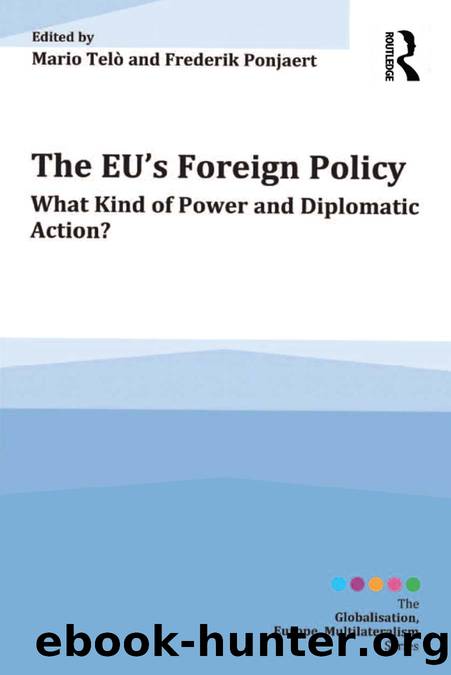The Eu's Foreign Policy: What Kind of Power and Diplomatic Action? by Mario Telò & Frederik Ponjaert

Author:Mario Telò & Frederik Ponjaert [Telò, Mario & Ponjaert, Frederik]
Language: eng
Format: epub
Tags: Political Science, Essays
ISBN: 9781317032649
Google: UkerCwAAQBAJ
Goodreads: 29443108
Publisher: Routledge
Published: 2013-03-28T00:00:00+00:00
Conclusion
As the above analysis has shown, at no time in the long history of progress towards a more coherent foreign policy have the significant innovations provided by the Lisbon Treaty been brought to life in more difficult global circumstances. Similar to the EPC, the Single European Act, Maastricht and the treaties of Amsterdam and Nice, Lisbon does initiate further enhancement of coherence in European foreign policy. Nevertheless, it is bound to fail to achieve its ambitious goals once again. Whilst previous treaty revisions also had obvious shortcomings, they were normally concluded in a more favourable spirit of general optimism about the European project. EPC began its life in the positive climate of East-West détente. The Single European Act became a catalyst for improving the common market. Maastricht was signed in the context of Western pride about the peaceful ending of the Cold War to which European integration had so significantly contributed. Amsterdam and Nice promised to prepare for the big wave of enlargement for the completion of the common European house that Europeâs founding fathers had envisaged. In contrast, the Lisbon Treaty lacks any sign of surrounding enthusiasm. It was signed after a decade of lost economic competitiveness at the global stage and a long-drawn out negotiation marathon that saw severe political and institutional setbacks ever since the Constitutional Convention. With the Lisbon Treaty there was a bigger clash between desires and realities from the very start, and there was already a sense of exhaustion even before the new institution began to operate. And then, even worse, the real financial and political crisis hit.
In times of severe political and economic uncertainty it is not only traders in financial markets and politicians who might occasionally overreact. Also academic analysts tend to amplify views and fuse analysis with intellectual crusades. Being aware of such danger one needs to give the new institutions in foreign policy, the EEAS and the High Representative, time to find their footing before offering a considered judgement. Nevertheless, with its internal tensions and contradictions, the EUâs external relations might for the foreseeable future remain as incoherent as they have ever been.
Europeâs engagement with the rest of the world, more moderate targets for common action, a less ambitious rhetoric and small steps towards concrete successes in managing global problems might be all one can and should ask for.
Europeâs obsessive desire for coherence and consistence might never stand the tests of practice anyway. Quoting some of the most incisive intellectuals on âconsistencyâ might not deliver solutions for one of the EUâs most long-standing dilemmas but it provides at least some comfort. For bad or for worse, it might in fact be true that âfoolish consistency is the hobgoblin of little mindsâ (Ralph Waldo Emerson, Self-Reliance, 1841), that âconsistency is the enemy of enterprise, just as symmetry is the enemy of artâ (George Bernard Shaw, 1991) and that, ultimately, âconsistency is contrary to nature, contrary to life. The only completely consistent people are the deadâ (Aldous Huxley).3
Long live EU foreign policy.
Download
This site does not store any files on its server. We only index and link to content provided by other sites. Please contact the content providers to delete copyright contents if any and email us, we'll remove relevant links or contents immediately.
Killers of the Flower Moon by David Grann(3227)
Machine Learning at Scale with H2O by Gregory Keys | David Whiting(2262)
Will by Will Smith(2031)
Guns, Germs and Steel by Diamond Jared(1876)
Borders by unknow(1779)
The Room Where It Happened by John Bolton;(1717)
The Color of Law by Richard Rothstein(1574)
Once Upon a Broken Heart by Stephanie Garber(1470)
Water Rights and the Environment in the United States by John Burch(1411)
Examples & Explanations: Administrative Law by William F. Funk & Richard H. Seamon(1324)
Friends, Lovers, and the Big Terrible Thing by Matthew Perry(1320)
A Short History of War by Jeremy Black(1295)
Pharmacy Practice and The Law by Richard Abood(1252)
HBR's 10 Must Reads 2022 by Harvard Business Review(1251)
That Every Man Be Armed by Stephen P. Halbrook(1236)
The Strength In Our Scars by Bianca Sparacino(1233)
The Guarded Gate by Daniel Okrent(1217)
515945210 by Unknown(1205)
Injustices by Ian Millhiser(1196)
